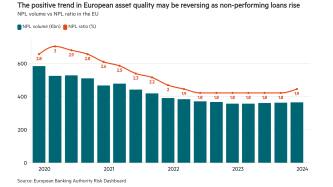In this year’s edition of Lloyds Bank’s Financial Institutions Sentiment Survey, the lender compiled insights from more than 100 senior personalities and decision-makers at UK banks, insurers, wealth and asset managers and financial sponsors, among others. The survey lays out the trends, opportunities and risks in a market still battling with high inflation and economic uncertainty.
The survey found that the largest proportion of respondents thinks that growth within the financial services sector will remain largely unchanged compared to previous years. More than four in five experts (86%) say that they will either maintain or increase their current investment quota over the next few years, with a particular focus on technology and talent retention.
Lisa Francis, managing director, institutional coverage at Lloyds Bank, says that the results of the survey give a sense of reassurance that the UK will remain at the forefront of the global financial industry. Half of respondents think that London will maintain its status as a leading financial services hub in the years to come.
The emergence of new opportunities for growth over the past 12 months is a sign that the worst of the economic downturn may have passed, says Ms Francis. According to the survey, the rate of respondents who expressed a positive outlook for the economy has tripled compared to last year, now standing at 21%.
“I have worked in the industry for a long time and it struck me how it is constantly evolving, and I think that there are definitely new challenges,” says Ms Francis, hinting at the growing interest around artificial intelligence (AI) as a driving force for innovation within the banking and finance sector. “I think it’s good to understand what is really on our clients’ minds and to see it written down in black and white,” she says.
Although seven in 10 (68%) of the people that participated in the survey say that London’s status has diminished over time, respondents identified actions that would help maintain or enhance the city’s position as a global financial centre, including building better relations between the UK and the EU, more freedom from regulations, and better use of new technologies.
Incorporating AI
Talks about technological advancements and the development of AI have permeated the financial service sector in recent months. According to the survey, AI is seen as a tool that could help the sector become more productive and give the UK a competitive edge in the market.
The majority of respondents (80%) think that AI will be the carrier of significant change for the UK economy, which, according to the survey, may bring a variety of outcomes, including an increase in productivity, the redundancy of some skilled and unskilled jobs, as well as the creation of new positions.
Ms Francis says that technology is a “huge enabler” that is helping banks across the globe improve their productivity, while also pushing for better outcomes for their clients. “Many of our clients think that technology — and predominantly AI — will change the shape of the industry within the next three years, and I think that it is key to maintain the relevance of the UK within the sector,” she says.
According to a 2023 report by McKinsey, generative AI could add between $200bn and $340bn in value to the banking sector by elevating its services, including the enhancement of its productivity. Some of the uses that banks can make of AI include going through regulators’ reports, improving client service by preparing documents that are traditionally written by hand, and writing technical reports, McKinsey says.
“I think that the AI industry is also helping in terms of the amount of raw data that we have at our fingertips, and the way we can utilise that data to provide a better experience for our customers, get better client insight and find out about new trends,” says Ms Francis. If businesses are able to effectively safeguard their clients’ confidentiality, she adds, they could really benefit from the technology.
Nevertheless, the field of AI remains a new, uncharted territory for many businesses that are still unsure about its widespread use. According to Lloyds’ survey, while 56% of respondents see the technology as an opportunity for growth, 41% are still ambivalent or undecided about its use. Only 3% see it as a direct threat to their business.
Attracting and retaining talent
In the survey, firms said that attracting and retaining talent is their top strategic priority to remain relevant in the market, with 54% of respondents naming it as one of their primary concerns.
People are the most important asset in the UK’s financial services, which relies on them to maintain and innovate their business, says trade association UK Finance. Recent world events have drastically changed the way people work and have had an impact on the type of skills that many businesses now require. However, investments in employee learning and development from financial institutions are not keeping up with the pace of change within the sector.
Ms Francis says that both retaining and attracting new talent are core elements of the financial services industry. “We have spoken about technology and the importance of it, we all know that, but attracting top-tier talent to the financial services industry is also absolutely paramount,” she says.
Ms Francis explains that the UK needs to keep attracting multi-diverse talent into its borders, which she admits has become more difficult since the introduction of newer immigration rules. Nevertheless, the country still remains a major global hub for professionals, she says.
While on one hand, businesses are prioritising the recruitment of new talent, more than half of the survey’s respondents believe that a number of skilled and unskilled job positions may become redundant due to AI. However, Ms Francis says, despite new technological developments, the financial services sector and the labour market remain intrinsically interconnected by the need of the former to have a pool of talent with different sets of skills. This includes skills in digital technology, which is now in high demand.
“We know from our conversations with most of our institutional clients that actively participating in the learning development of your own talent, which brings richness across the financial services business, remains core and essential for future growth and longevity of every organisation,” she says.












